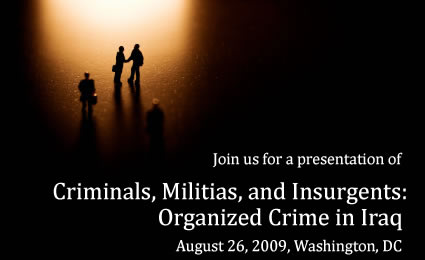
- Presented by Dr. Phil Williams
-
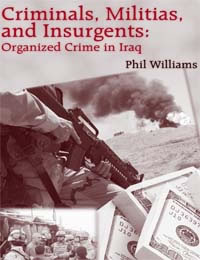 This is a can't miss, free event open to the public. Join us at The George Washington University, Washington, DC as Phil Williams presents his book, Criminals, Militias, and Insurgents, and participates in a discussion panel on the topic joined by
Dr. William Rosenau, of the RAND Corporation and John Picarelli, of the National Institute of Justice. A complimentary buffet lunch will be provided.
Dr. Phil Williams is a Visiting Research Professor at SSI and the founding editor of the journal Transnational Organized Crime. Dr. Williams has been a consultant to both
the United Nations and United States government agencies on organized crime. In this book Dr. Williams looks in detail at major criminal activities in Iraq and also considers the critical role played by corruption in
facilitating and strengthening organized crime. He also explains the rise of organized crime after the U.S. invasion and identifies necessary responses to organized crime and corruption in Iraq. More info and to RSVP visit the CLAI website.
This is a can't miss, free event open to the public. Join us at The George Washington University, Washington, DC as Phil Williams presents his book, Criminals, Militias, and Insurgents, and participates in a discussion panel on the topic joined by
Dr. William Rosenau, of the RAND Corporation and John Picarelli, of the National Institute of Justice. A complimentary buffet lunch will be provided.
Dr. Phil Williams is a Visiting Research Professor at SSI and the founding editor of the journal Transnational Organized Crime. Dr. Williams has been a consultant to both
the United Nations and United States government agencies on organized crime. In this book Dr. Williams looks in detail at major criminal activities in Iraq and also considers the critical role played by corruption in
facilitating and strengthening organized crime. He also explains the rise of organized crime after the U.S. invasion and identifies necessary responses to organized crime and corruption in Iraq. More info and to RSVP visit the CLAI website.
-
Upcoming Events
-
- August 26, 2009
- New Book Presentation: Criminals, Militias, and Insurgents: Organized Crime in Iraq
- Washington, DC, United States
-
- October 29-30, 2009
- Drug Trafficking, Violence and Instability in Mexico, Colombia, and the Caribbean: Implications for US National Security
- Pittsburgh, PA, United States
- More Events...
-
-
Featured Papers
- Below are our recently published Carlisle (Student) Papers, LeTort Papers, and Colloquium Briefs
-
- Taking Up the Security Challenge of Climate Change
- Authored by Rymn J. Parsons.
-
- 2009 Key Strategic Issues List
- Edited by Dr. Antulio J. Echevarria, II.
-
- On Peace: Peace as a Means of Statecraft
- Authored by Colonel James H. Herrera.
-
- Strategic Implications of Emerging Technologies
- Authored by Dr. Antulio J. Echevarria, II.
-
Coming Soon
-
- Criminals, Militias, and Insurgents: Organized Crime in Iraq
- Dr. Phil Williams
-
- Mind-Sets and Missiles: a First Hand Account of the Cuban Missile Crisis
- Mr. Kenneth Michael Absher
-
- Baghdad ER--Revisited
-
- Russian Elite Image of Iran: From the Late Soviet Era to the Present
-
Of Current Interest
- Quick access to SSI analysis about The Changing Nature of War.
- Redeployment of the Jedi, by Colonel Christine D. Cook, USAR.
- Challenge to Change: Developing Leaders for the Nonkinetic Fight, by Major General Mari K. Eder, USAR
Faculty Spotlight

- Toward a Risk Management Defense Strategy
- Authored by Mr. Nathan P. Freier.
-
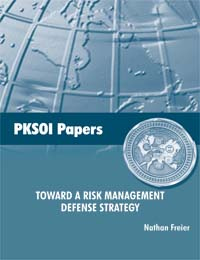 This monograph offers key considerations for DoD as it works through the on-going defense review. The author outlines eight principles for a risk management defense strategy. He argues that these principles provide “measures of merit” for evaluating the new administration’s defense choices. This monograph builds on two previous works—Known Unknowns: Unconventional “Strategic Shocks” in Defense Strategy Development and The New Balance: Limited Armed Stabilization and the Future of U.S. Landpower. Combined, these three works offer key insights on the most appropriate DoD responses to increasingly “unconventional” defense and national security conditions. This work in particular provides DoD leaders food for thought, as they balance mounting defense demands and declining defense resources.
This monograph offers key considerations for DoD as it works through the on-going defense review. The author outlines eight principles for a risk management defense strategy. He argues that these principles provide “measures of merit” for evaluating the new administration’s defense choices. This monograph builds on two previous works—Known Unknowns: Unconventional “Strategic Shocks” in Defense Strategy Development and The New Balance: Limited Armed Stabilization and the Future of U.S. Landpower. Combined, these three works offer key insights on the most appropriate DoD responses to increasingly “unconventional” defense and national security conditions. This work in particular provides DoD leaders food for thought, as they balance mounting defense demands and declining defense resources. - Added August 11, 2009 | Read the Summary | Download the PDF | More...

- New Partnerships for a New Era: Enhancing the South African Army's Stabilization Role in Africa
- Authored by Professor Deane-Peter Baker.
-
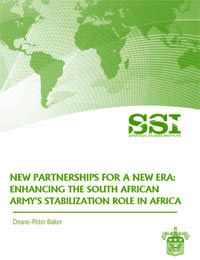 Since emerging from the mire of its apartheid past, South Africa has become a key player in Sub-Saharan Africa. The challenge of creating a truly national military, during a period in which South Africa has also wrestled with tough internal socio-economic problems, has left the South African National Defence Force (SANDF) in a weakened state. Despite this, they have in recent years made a considerable contribution to efforts to bring peace and stability to the African continent. A critical step in building a capable and confident future South African Army has been the commencement of the SA Army’s Vision 2020 forward planning process. Recent political changes in both the United States and South Africa have opened up a new window of opportunity for developing a productive partnership between the two nations. This monograph outlines ways in which the United States can contribute to the SA Army’s Vision 2020 program to help optimize South Africa’s potential contribution to the emergence of a peaceful and stable Africa.
Since emerging from the mire of its apartheid past, South Africa has become a key player in Sub-Saharan Africa. The challenge of creating a truly national military, during a period in which South Africa has also wrestled with tough internal socio-economic problems, has left the South African National Defence Force (SANDF) in a weakened state. Despite this, they have in recent years made a considerable contribution to efforts to bring peace and stability to the African continent. A critical step in building a capable and confident future South African Army has been the commencement of the SA Army’s Vision 2020 forward planning process. Recent political changes in both the United States and South Africa have opened up a new window of opportunity for developing a productive partnership between the two nations. This monograph outlines ways in which the United States can contribute to the SA Army’s Vision 2020 program to help optimize South Africa’s potential contribution to the emergence of a peaceful and stable Africa. - Added June 24, 2009 | Read the Summary | Download the PDF | More...
- Guide to Rebuilding Governance in Stability Operations: A Role for the Military?
- Authored by Derick W. Brinkerhoff, Ronald W. Johnson, Richard Hill. Edited by Professor Susan Merrill.
-
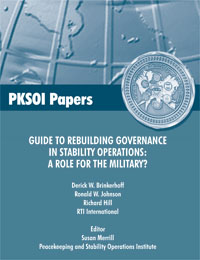 In October 2008, the U.S. Army issued Field Manual 3.07, Stability Operations Doctrine, which identified five key sectors as components of an integrated approach to stabilization and reconstruction (S&R) operations—security, justice and reconciliation, humanitarian assistance and social well-being, participatory governance, and economic stabilization and infrastructure. Government, or governance, has a central role in assuring the successful end-states for transition in each of these sectors. This guide focuses on the military’s role in rebuilding and establishing a functional, effective, and legitimate nation-state; one that can assure security and stability for its citizens, defend its borders, deliver services effectively for its populace, and is responsible and accountable to its citizens. Neither a handbook nor a checklist, the document provides a comprehensive approach to planning and implementing a program to rebuild governance by U.S. peacekeeping forces during stability operations. Recognizing that the extent of U.S. Government and military involvement is determined by the mandate, the mission, the level of resources and most importantly, the host country context, this guide provides options and trade-offs for U.S. forces in executing these operations.
In October 2008, the U.S. Army issued Field Manual 3.07, Stability Operations Doctrine, which identified five key sectors as components of an integrated approach to stabilization and reconstruction (S&R) operations—security, justice and reconciliation, humanitarian assistance and social well-being, participatory governance, and economic stabilization and infrastructure. Government, or governance, has a central role in assuring the successful end-states for transition in each of these sectors. This guide focuses on the military’s role in rebuilding and establishing a functional, effective, and legitimate nation-state; one that can assure security and stability for its citizens, defend its borders, deliver services effectively for its populace, and is responsible and accountable to its citizens. Neither a handbook nor a checklist, the document provides a comprehensive approach to planning and implementing a program to rebuild governance by U.S. peacekeeping forces during stability operations. Recognizing that the extent of U.S. Government and military involvement is determined by the mandate, the mission, the level of resources and most importantly, the host country context, this guide provides options and trade-offs for U.S. forces in executing these operations. - Added June 18, 2009 | Read the Summary | Download the PDF | More...

